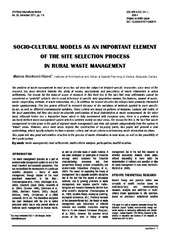Приказ основних података о документу
Socio-cultural models as an important element of the site selection process in rural waste management
| dc.creator | Nenković-Riznić, Marina | |
| dc.date.accessioned | 2018-12-26T10:57:31Z | |
| dc.date.available | 2018-12-26T10:57:31Z | |
| dc.date.issued | 2011 | |
| dc.identifier.issn | 1450-569X | |
| dc.identifier.uri | https://raumplan.iaus.ac.rs/handle/123456789/207 | |
| dc.description.abstract | The problem of waste management in rural areas has not been the subject of detailed specific researches since most of the research has been directed towards the study of means, mechanisms and procedures of waste elimination in urban settlements. The reason for the reduced scope of research in this field lies in the fact that rural settlements cannot be considered as 'grateful' subjects due to usual deficiency of specific data (population number, fluctuations, amount of waste, waste composition, methods of waste elimination, etc.). In addition, for several decades the villages have primarily eliminated waste spontaneously. This has proven difficult to research because of the variations of methods applied to each specific locale, as well as different environmental variables. These criteria are based on patterns of behavior, customs and habits of the local population, but they also insist on absolute participation of local stakeholders in waste management. On the other hand, although Serbia has a legislative frame which is fully harmonized with European laws, there is a problem within unclearly defined waste management system which is oriented mainly on rural areas. The reason for this is the fact that waste management in rural areas is the part of regional waste management, and does not operate independently from the system in 'urban' areas. However, since rural areas require the construction of recycling yards, this paper will present a new methodology, which equally valuates techno-economic criteria and social criteria in determining waste elimination locations. This paper will also point out varieties of actors in the process of waste elimination in rural areas, as well as the possibility of their participation. | en |
| dc.publisher | Institute of Architecture, Urban & Spatial Planning of Serbia | |
| dc.relation | info:eu-repo/grantAgreement/MESTD/Technological Development (TD or TR)/36035/RS// | |
| dc.rights | openAccess | |
| dc.rights.uri | https://creativecommons.org/licenses/by-nc-nd/4.0/ | |
| dc.source | Spatium | |
| dc.subject | waste management | en |
| dc.subject | rural settlements | en |
| dc.subject | multi-criteria analysis | en |
| dc.subject | participation | en |
| dc.subject | landfill location | en |
| dc.title | Socio-cultural models as an important element of the site selection process in rural waste management | en |
| dc.type | article | |
| dc.rights.license | BY-NC-ND | |
| dcterms.abstract | Ненковић-Ризнић, Марина; | |
| dc.citation.issue | 26 | |
| dc.citation.spage | 1 | |
| dc.citation.epage | 6 | |
| dc.citation.other | (26): 1-6 | |
| dc.citation.rank | M24 | |
| dc.identifier.doi | 10.2298/SPAT1126001N | |
| dc.identifier.scopus | 2-s2.0-84861463676 | |
| dc.identifier.fulltext | https://raumplan.iaus.ac.rs//bitstream/id/1554/204.pdf | |
| dc.type.version | publishedVersion |

